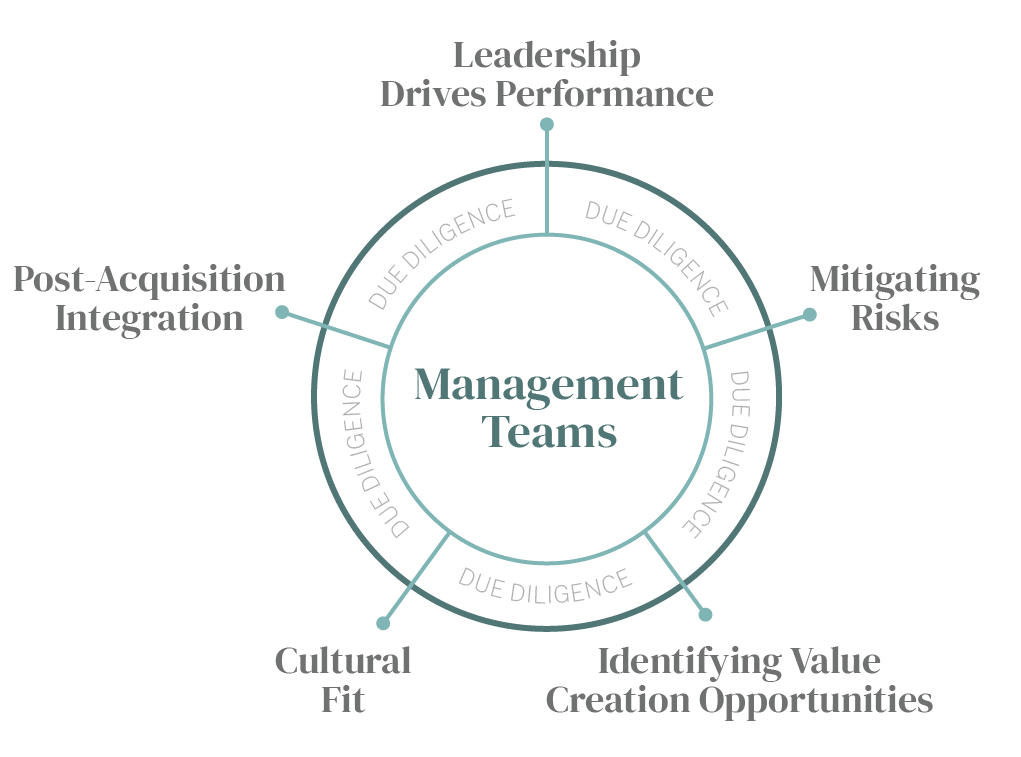At Blackford, our due diligence related to the executive management team and company executive processes is critical to assessing the potential success of any acquisition.
When a private equity (PE) firm is considering acquiring a company, it goes through a due diligence process to evaluate the target company’s financial, supply, legal, operational, and strategic performance. Each aspect is essential to the evaluation, but it is the due diligence related to the management team processes and executive leadership that is the most critical component.
Financial models, quality of earnings, and process evaluations do not come alive and create value until, and unless, the RIGHT person engages with it. Neither spreadsheets nor value stream maps create any value on their own. The ideal people-focused due diligence would be to conduct an audit and assessment of both the leadership and entire employee base, but we can learn 90% of what we need to know simply by talking to the leadership team and assessing their effectiveness and the strength of their processes.

Here are five reasons why we consider this the most important part of our due diligence process:
1. Leadership drives performance
A strong and effective management team can drive the success of a company, even in challenging market conditions, and a weak or ineffective management team can hinder a company’s performance, even in favorable market conditions. We need to look beyond the experience, education and track record of the management team and dive deeper into the motivations of the leaders, the effectiveness of the interrelationships of the management team, the structure of their key processes, as well as the extent to which they have shown the discipline to follow their processes, particularly when under stress.
Blackford assesses planning processes, financial reporting and controls, lean enterprise and continuous improvement processes, communication processes, processes for the development of people, accountability and reward systems just to name a few. It is our experience that these processes exist like an operating system in a computer. They run in the background. And, while many activities are enabled—even empowered—by these systems, even one malfunctioning process the impact can bring things to a screeching halt.
2. Mitigating risks
The due diligence process is also an opportunity for PE firms to identify and mitigate potential risks associated with the management team. For example, if the management team lacks experience in managing growth, leading a turnaround or integrating add-ons, this could lead to challenges in scaling the business post-acquisition. There is also always the question of identifying key leaders who have been instrumental in creating value and driving growth – and those the business may have outgrown and need to be replaced. A good assessment will help determine these risks, and by identifying them early on, one can take proactive measures to mitigate them.
3. Identifying value creation opportunities
Private equity brings to acquisitions a unique set of expectations for value creation that are not part of the daily operation of a small business. The challenges of value creation (EBITDA, multiple enhancements, financing choices and debt reduction) may not have been the focus or responsibilities of the leadership team in his/her small to middle sized business. But if it is the expectation that things like add-ons, expanding into new markets, or new product development will be part of the value creation path, ensuring the right people, with the right experience are in place will be essential.
4. Cultural fit
Leadership impacts performance and the management team also plays a crucial role in shaping the company’s culture. The processes put in place by leadership can be the true determinant of employee engagement and ultimately, success.
Particularly in private equity where the time is short and the stakes are high, there is very little time to get leadership and culture right. Therefore, this assessment will determine if the “right stuff” exists. It will quickly clarify what needs to be built up or brought into the business in the very early days of ownership. Whether the intention is to keep the current management team in place or to bring in additional top talent to fill mission-critical roles, understanding the culture through a focused due diligence process is a critical component to ensuring the right team is in place to achieve both immediate and exit-thesis operational and financial goals.
5. Post-acquisition integration
A successful acquisition depends on the post-acquisition integration of the target company into the private equity firm’s portfolio. The management team’s role in this process cannot be understated. Effective management teams can help to facilitate the integration process by aligning with the PE firm’s strategic objectives and leading the cultural and operational changes necessary to achieve them. This background is often not part of the experience of an in-place management team. Comprehensive due diligence in this area may lead to either the assignment of an operating partner, boards of directors or other leaders to support the integration process either with other companies on a platform basis or with Blackford as the new owner.
While each component of the due diligence process is important, the due diligence of the management team and leadership is the most critical and may be the principal driver of value creation in the short and long term. The time and resources dedicated to it should match its importance. Effective management teams can drive a company’s success, identify and capitalize on value creation opportunities, mitigate potential risks, facilitate post-acquisition integration, and shape the company’s culture.

Paul Doyle is an Operating Partner at Blackford Capital. Paul brings with him more than 30 years of diverse business experience, including 20 years as a CEO leading manufacturing and leadership development companies. He has been active in North America with companies ranging from $20 million to $300 million in revenue